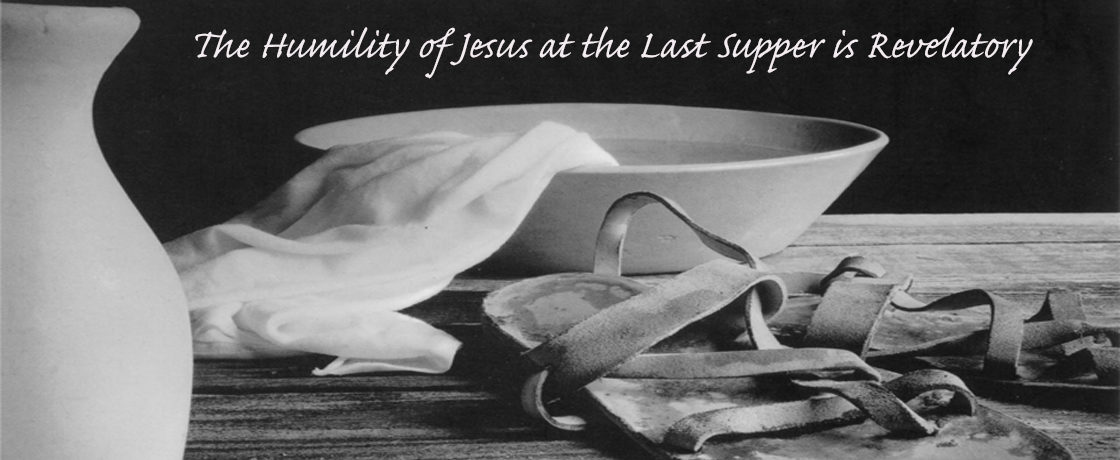The Humility of Jesus at the Last Supper is Revelatory
Jesus’ Humility Reveals His Love
John 13:1 Now before the Feast of Passover, Jesus, knowing that His hour had come that He would depart from this world to the Father, and having loved His own in the world, loved them to the end. 13:5 Then He poured water into the wash basin and began to wash the feet of the disciples, and to wipe them dry with the towel.
The object of the love of God in Christ in these chapters is not the lost world, but the newly forming people of God. They were the disciples of the Messiah, the future church, the community of the elect. Jesus had loved His own all along; He now showed them the full extent of His love.
With a knowledge of His coming death, His resurrection, His glory, with the task of sin-bearing on the cross, He was still preoccupied with a totally perfect, consuming full love for these disciples and those who would believe.
An Object Lesson Jesus Washes Their Feet
Doubtless, the disciples would have been happy to wash Jesus’ feet. However, they could not conceive of washing one another’s feet, since this was a task normally reserved for the lowliest of menial servants.
Jesus washing the disciples’ feet at the Last Supper is symbolic of spiritual cleansing, and a given standard of humble service. It is therefore a call to all of Jesus’ disciples to exercise humility. The foot washing was symbolic of the crucifixion, an act of God by which human beings are freed or cleansed, whether in reality, at the cross, or in symbol, the foot washing. The heart of the humble example He gave, is one that Jesus’ followers are to emulate.
Jesus’ Humility Reveals Our True Character
John 13:6 Then Jesus came to Simon Peter: and Peter said to Him, “Lord, you are not going to wash my feet.”
Peter reveals his incomprehension by these words.
At this point, they were not as concerned about others or humility. Luke 22 displays how selfish and worldly they were. There was a strife among them concerning which of them should be accounted the greatest.
John ensures that his readers will grasp just how strongly this episode attests to the loving character of Jesus. He was about to wash their feet; this included Judas Iscariot, whose treacherous plot had already been conceived.
John 13:9 Simon Peter said unto Him, “Lord, not my feet only, but also my hands and my head.”
Once the symbolism is seen, Jesus’ words are almostvinevitable: Unless I wash you, you have no part with Me. That is always true: unless the Lamb of God has taken away a person’s sin, has washed that person,
he or she can have no part with Him.
Peter objected. His objection was candid and well motivated, but totally ignorant of his Master’s course.
Jesus expects Peter to submit to the washing, in faith. Peter and the others will understand it all better, later. This does not refer to the specific foot washing, but to the passion to which the foot washing points.
The foot washing symbolizes the cleansing that is the result of Christ’s impending cross-work.
Peter does not need a full bath; the initial and fundamental cleansing that Christ provides is a once-for-all act.
The common experience of natural life has its counterpoint in spiritual existence: The person who has taken a bath and is basically clean, may nevertheless need to have his feet washed after a short walk on dusty roads, even though another bath would be superfluous. In the same way, the disciples have received the cleansing salvation, prospectively, by faith: you are clean.
When Jesus washed the disciples’ feet, He included the feet of Judas Iscariot. If this proves anything beyond the great love and forbearance of the Master, it is that no rite, even if performed by Jesus Himself, ensures spiritual cleansing. Real cleansing is effected both through Christ’s revelatory Word, and through the atoning sacrifice to which the foot washing pointed.
Jesus’ Humility Reveals Our Loyalty
John 13:12 So after He had washed their feet, and had taken His garments, and had set down again, He said to them, do you know what I have done to you? 13:15 For I have given you an example, that you should do as I have done to you.
Even when the foot washing points in various ways to spiritual cleansing based on Christ’s death, both the foot washing and His atoning death are the supreme displays of Jesus’ love for His own.
The fellowship of the cleansed—believers, that Jesus is creating is to be characterized by the same love, and same self-abnegation for the sake of serving others.
The point of the proverb voiced by Jesus’ actions here is painfully clear: no emissary has the right to think he is personally exempt from tasks that were cheerfully undertaken by the One who sent him. No slave has the right to judge any menial task beneath him after his master has already performed it. In 2018… Love! Serve!

